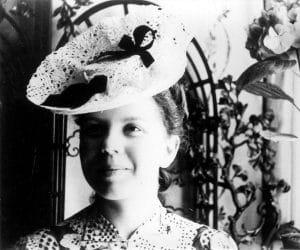Born in France, Rousseau was known for her excellent memory. It worked for languages, too: she was fluent in German. That helped when Nazi Germany occupied France. Rousseau, who lived in Dinard, in coastal Brittany, was recruited by the mayor to be a interpreter — and was good enough at it that she was often brought into meetings with German military officers. “The Germans still wanted to be liked then,” she said in a 1998 interview with the Washington Post. “They were happy to talk to someone who could speak to them.” And they bragged about what they knew. Rousseau started taking note of little bits of intelligence, though she didn’t have any communications channel to send the information to Allied forces. “I was storing my nuts, but I had no way to pass them on,” she said. In September 1940, she was recruited as a spy. She told her handler, “What’s the point of knowing all that, if not to pass it on?” Thanks in large part to her good memory, Rousseau’s reports proved to be extremely valuable to British intelligence. So much so, the Nazis realized there was a spy in Dinard. The Gestapo arrested her, but German officers came to her aid, saying the beautiful 21-year-old woman couldn’t be a spy! The Gestapo let her go, but ordered her to stay away from the coast. So Rousseau went to Paris, realized that the best way to gather information would be to get a job where she would overhear good information, and got hired as an interpreter by the National Industrial Council.

Rousseau had lost contact with her coastal handler, but happened to see a university classmate on a train. Georges Lamarque was also a spy — he ran the “Druids” network — and they agreed to work together. She started hearing bits and pieces about a “special weapon” the Germans were building, and got herself invited to parties the officers had after work so she could listen in and get more details. “I was such a little one, sitting with them, and I could not but hear what was said,” she said. “And what they did not say, I prompted. I teased them, taunted them, looked at them wide-eyed, insisted that they must be mad when they spoke of the astounding new weapon that flew over vast distances, much faster than any airplane. I kept saying: ‘What you are telling me cannot be true!’ I must have said that 100 times. ‘I’ll show you!’ one of the Germans said. ‘How?’ I asked, and he answered: ‘It’s here on a piece of paper!’” The officer showed her drawings of the V-2 rocket under development, and even where the work was being done: Peenemünde.
By September 1943, she knew so much that she was able to send a detailed report about the V-2’s development to London. Winston Churchill himself ordered the bombing raid on the Peenemünde site and, when that didn’t finish the job, three more waves of bombers over the next several months. The attacks slowed down the Nazi rocketry efforts, and likely saved thousands of lives. The British were so impressed by the continuing detailed information from agent “Amniarix” they decided to evacuate her to London before the D-Day landings. But before she could board a submarine, she was betrayed, and again captured by the Gestapo. Despite torture in three different concentration camps, German agents couldn’t break her. She waited out the war at the Ravensbruck concentration camp, and was finally liberated by the Swedish Red Cross. She had to find her own way through Germany and Denmark in the winter, and arrived in Sweden weighing only 70 pounds. After regaining her strength, she went back to work as an interpreter, married, had children, and rarely talked about her exploits during the war. Rousseau was, however, given the CIA’s Agency Seal Medal in 1993 for her service to intelligence operations. She died in France on August 25, at 98.
Author’s Note: Rousseau was featured in Uncommon Sense, the This is True Podcast, We Need Better Heroes. You can listen to it right from that page, if you don’t use a Podcast app.
